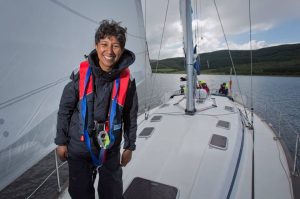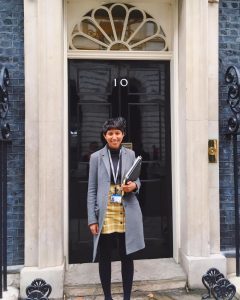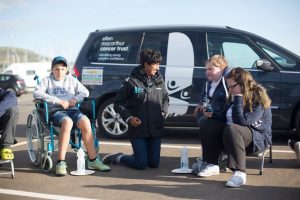14 October 2019
It’s 16 years since the Trust set sail – what are the young people who have been trips up to now?
In the same way volunteers, who were previously young people, encourage aspiration and possibility in new young people, so the stories of those who have since embarked on successful careers and followed interesting life paths can be equally inspirational.
In our 'My life now' series, young people share what their lives look like years on from their time with the Trust. This month meet Claire Amaladoss.
Name
Claire Amaladoss
Age
26
What were you diagnosed with and when?
Hodgkin’s Lymphoma, 2006
When did you first sail with the Trust?
2007
What do you do now?
I’m a civil servant. I work as a policy lead on prevention and public health at the Department of Health and Social Care in Westminster.
What does that involve?
The Civil Service help the government to make decisions and improve public services. We’re impartial and serve whoever the government of the day
is.
Leading on prevention, I give advice to Ministers on what action the government can take to make sure people who need it take up opportunities for screening and health checks, consider how we can give people the information and support they need to make healthy choices, and how we can prioritise the early years of life which are so important for our development.
Why did you want to do this?
I wanted to make a positive impact on the society around me. If anything, surviving cancer made me a bit too
obsessed with impact! I used to struggle to have a lie-in and relax at the weekend (not anymore!) and wanted to wake up and USE every single day.
My job now gives me the opportunity to work in something I care about. I knew that I enjoyed looking at the evidence, analysing problems and potential solutions, and meeting a wide range of people, so it seemed a good fit. My cancer treatment showed me the importance of positive experiences with healthcare and I’m keen that if people do need to interact with healthcare, that’s what they get too.
 What’s the coolest
thing you’ve done lately?
What’s the coolest
thing you’ve done lately?
Over the last year, I’ve had the opportunity to visit 10 Downing Street a few times. It’s amazing to approach the famous door and there’s such a sense of
history. Every time I go I think about how proud my grandparents would be and it’s the best feeling! I also took a dip in the cold sea in Sweden a couple of weeks ago which felt
brave!
Why did you need the Trust’s support in recovery?
It goes without saying that chemotherapy is a gut-wrenching, gruelling experience. But as hard, for me, was returning to
school once my treatment had finished. Plugged in and wired to machines on a hospital ward, I had to find some way to cope; something to fix my sights on, something to occupy the space at the end of
my tunnel vision. And that something became my life before cancer.
It was the things I missed and hoped to return to. It was football matches, takeaway pizza and surreptitiously passing notes to my friends in classrooms. I assumed that waiting for me at the end of cancer was my life as it was before cancer. When I heard the words “all clear” it was a shock to discover that life was something very different.
It was humiliating not to be able to out-run a single classmate in PE lessons. It was infuriating to hear my classmates' carefree conversations about EastEnders and birthday parties as I dealt with bereavement and thought of the friends I'd shared life with on the paediatric oncology ward who had not survived.
And it felt futile to listen to my teachers or prepare for exams when I knew that I could relapse and life could be thrown off course again. School had become quite a lonely, isolating place and the future didn't seem like something that was mine to look forward to anymore.
 What part has
the Trust played in you doing what you are now?
What part has
the Trust played in you doing what you are now?
The Trust put me in touch with others my age who had gone through the same experience and helped me open up.
Spending time with others at different stages in their recovery provided reassurance that what I was feeling was normal, but also restored my sense of possibility; I met young adults who had cancer as teenagers and were now thriving. I was able to be honest about the sense of survivor's guilt I felt.
I slowly grew more confident in my physical capability and learnt how to push myself. Most of all, I had fun with peers and stopped carrying the weight of the world on my shoulders. The Trust supported me for several years and got me to a place where I managed to take my exams and go to university.
Without the Trust’s support and the sense of possibility it gave me, I don’t think I’d have had the confidence to persevere with my education and believe I could engage in employment.
What’s your top tip for a young person interested in working for the civil service?
Stay up to date with current affairs from a range of different sources, especially those
you don’t necessarily agree with! Don’t be afraid to reach out to people working in politics, including your local MP. Pop them an email explaining your interests and you’ll be surprised that they’ll
often reply and be happy to meet with you or offer you some work experience.
[embed]https://youtu.be/_ombMV_sfHE[/embed]